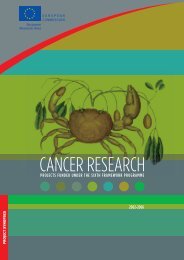I527-290 ESRIF Final Report (WEB).indd - European Commission
I527-290 ESRIF Final Report (WEB).indd - European Commission
I527-290 ESRIF Final Report (WEB).indd - European Commission
Create successful ePaper yourself
Turn your PDF publications into a flip-book with our unique Google optimized e-Paper software.
218<br />
a common <strong>European</strong> idea of security research but lead to the development of separate national thematic references for<br />
security research (coordination). It could be argued that Sweden and the UK are countries in which questions that are in public<br />
opinion and policy framed as security questions are very close related to the normative foundations of statehood, refl ecting<br />
threats to the idea of the state as a collective security provider (Sweden: integration of information from diff erent sources for<br />
fi rst-responder emergency actions; UK: responding to citizens’ fear of conventional crime/violence and terrorist attacks), thus<br />
resulting in a predominance of national themes, however mirrored by an interest in implementing these themes along with<br />
emerging <strong>European</strong>/international standards, as well as making use of international knowledge and practices.<br />
Austria and Spain represent cases in which the eff ect of model-I and model-II cultural factors is just opposite – and in which<br />
cultural factors in sum have a negative eff ect on security (research) governance. Normative values were found to contribute<br />
to reducing gaps, as both countries have a public culture that fosters the idea of making public choices on the basis of<br />
pluralistic assessments and with a view of the functioning of the social/political system as a whole. Styles of developing<br />
knowledge and interpretation (giving political meaning to facts) were found to have in sum an amplifying eff ect on gaps<br />
in both countries. In Austria, the tradition and structure of consocialism and consensus democracy limits the potential<br />
for developing shared <strong>European</strong> understandings on security problems and agree on a common interpretation of the<br />
value/seriousness of security challenges; the interpretation of security as a task of the level of the state organization as a<br />
whole limits the development of internationally comparable security strategies. It can also be expected to limit the social<br />
acceptance of international solutions for security problems, not (re-)designed to national needs. In Spain, normative ideal of<br />
security based on and contributing to innovation does not open up space for a promotion of comprehensive international<br />
solutions and convergence of security (research) strategies, as it is mainly interpreted in national terms of science and<br />
technology. At the same time, Spain typically uses EU institutions to promote its own agenda and to seek support for own<br />
positions. This tendency is however limited by mistrust against other security cultures rooted in the countries politicals<br />
culture, which is marked by an aversion against “security”, resluting from remembrances of repressive security state in<br />
charge of public order.<br />
France and Germany are cases in which model-III cultural factors (symbolism and associated practices) were found to reduce<br />
gaps. National characteristics of security lead to the perception of security problems as having a generically transnational<br />
and international character. Security is at the same time seen as a symbol of preserving the values acquired by the society as<br />
a whole. In France, security has become a symbol for crisis management in a broad sense, independent from the source of<br />
origin. In Germany, security has become a symbol of preparedness and ability for defence of the nation against threats from<br />
without and from within. Both need additional legitimacy from higher-ranking, international values, such as democracy, rule<br />
of law and <strong>European</strong> integration. This background of political culture explains the potential for establishing comparability<br />
between national and <strong>European</strong> security strategies and call for a more comprehensive approach on a <strong>European</strong> level. It<br />
however needs to be added that in the case of Germany, model-III cultural factors were also found to have exacerbating<br />
eff ects on gaps. This has to be understood in the fi rst place as an eff ect of the German idea of a protective state (in the wake<br />
of the enlightened-absolutist public policy tradition of “gute polizey” in the 18th century), responsive to the specifi c security<br />
requirements of its citizens.<br />
Model-II cultural factors, relating to knowledge structures and styles of interpretation, were found in France and Germany to in<br />
sum cause/widen gaps, just as they were in Austria and Spain. France’s “sûreté” tradition/culture e.g. causes on overemphasis<br />
on the societal (as opposed to the technical) dimension, thus limiting potential for convergence of security research on a<br />
<strong>European</strong> level and causing incompatibility with the majority of national and <strong>European</strong> security (research) strategies with<br />
their focus on technical solutions to security problems. Germany’s interpretation of security as a task on the level of the<br />
state organization as a whole/as a government matter in the sense of civil protection sets constraints on a comprehensive<br />
approach both on a national and on a <strong>European</strong> level. It also limits acceptability of coordination with other national and<br />
<strong>European</strong>-level research programmes, or at least the perception of such coordination as useful for solutions to security<br />
problems on a national scale.<br />
10.3.1.6 Association of the Four Cultural Factors Identifi ed Gaps/Challenges<br />
Summarized oval all countries analysed (see matrix 4, annex 2), cultural factors have the strongest evidence of positive impact<br />
on (developing) a comprehensive approach at the national level; they have the strongest evidence of negative impact on splits<br />
<strong>ESRIF</strong> FINAL REPORT - PART 2 • Working Group: The governance and coordination

















